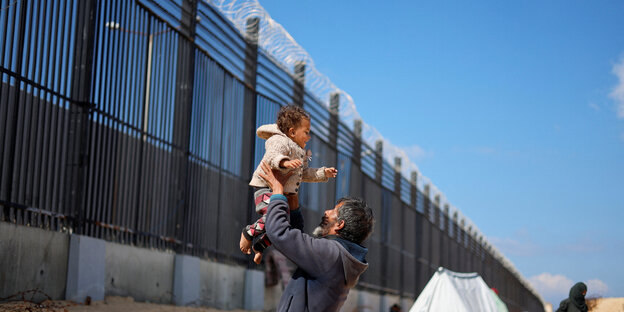The border between Gaza and Egypt is being strengthened. Cairo is apparently preparing for a massive attack in the event of a ground offensive in Rafah.

No passage: Rafah border facility between Gaza and Egypt on February 10 Photo: Mohammed Salem/Reuters
With the threat of an Israeli ground offensive in Rafah, the politically very sensitive border between Gaza and Egypt is coming into focus. More than a million people have been detained on the Palestinian side in and around the small town of Rafah.
Meanwhile, Egypt continues to expand its border fences and walls to the other side and only allows a few injured people to pass through for treatment in hospitals. But it is unclear whether the border could withstand a massive avalanche.
The Egyptian independent news portal Mada Masr According to reports, citing eyewitnesses on both sides of the border, in recent days the country has further expanded a concrete wall with barbed wire and a steel barrier. Cairo has also reportedly sent 40 tanks and military vehicles towards the border.
Cairo had already built a sand barrier and additional concrete barriers on the Egyptian side in November. Their goal is to prevent people from the Palestinian side from reaching a buffer zone on the Egyptian side. The Cairo regime has ruled out opening the border to those seeking protection on a large scale. Probably the main reason is that Palestinian refugees have been a major political force in countries like Jordan and Lebanon for decades.
When Israel left Sinai
The border between Gaza and Egypt is politically sensitive because, as part of their 1979 peace treaty that ended Israel's occupation of Egypt's Sinai Peninsula, both countries agreed to a buffer zone called the Philadelphia Corridor.
This 14 kilometer long strip, located on the Palestinian side, extends along the entire border area between Gaza and Egypt and should be controlled and patrolled by Israeli forces. Egypt also agreed to partially demilitarize the Sinai Peninsula.
Israel controlled the Philadelphia Corridor until 2005, when it completely withdrew its army from the occupied Gaza Strip and cleared all Israeli settlements in the area. Egypt and Israel also agreed to new rules at this time. Egypt was allowed to send 750 soldiers and heavy weapons to the area to monitor and secure the Egyptian side of the corridor. Two years later, Hamas took full control of the Gaza Strip, including the border area with Egypt.
Where to go in case of a ground offensive?
Now, two events once again call the security agreement into question: first, Israeli Prime Minister Benjamin Netanyahu has declared that he wants to put the Philadelphia Corridor back under Israeli control. The area “must be in our hands,” he said. Otherwise, the demilitarization of the Gaza Strip that Israel is fighting for would not be possible. Reclaiming the corridor would not affect Egyptian territory, but it would effectively separate the Gaza Strip from Egypt.
On the other hand, the question arises of what will happen if the Israeli army actually advances ground troops towards Rafah in the coming weeks. Netanyahu has indicated that civilians could flee from Rafah to the northern Gaza Strip, where many areas have been cleared by the army. However, aid organizations point out that free zones lacking infrastructure are not an option to accommodate tens of thousands of people.
A massive avalanche and possibly a breach of the highly secure border with Egypt cannot be ruled out, a scenario that Cairo wants to avoid at all costs. According to reports over the weekend, Cairo even threatened behind the scenes to suspend its peace treaty with Israel if the Israeli army invaded Rafah.
However, apparently responding to the reports, Foreign Minister Samih Shukri said on Monday: “There is a peace agreement between Egypt and Israel that has been in force for forty years and will remain in force.” The 1979 peace agreement with Israel was a historic step: Egypt was the first Arab country to officially recognize Israel.